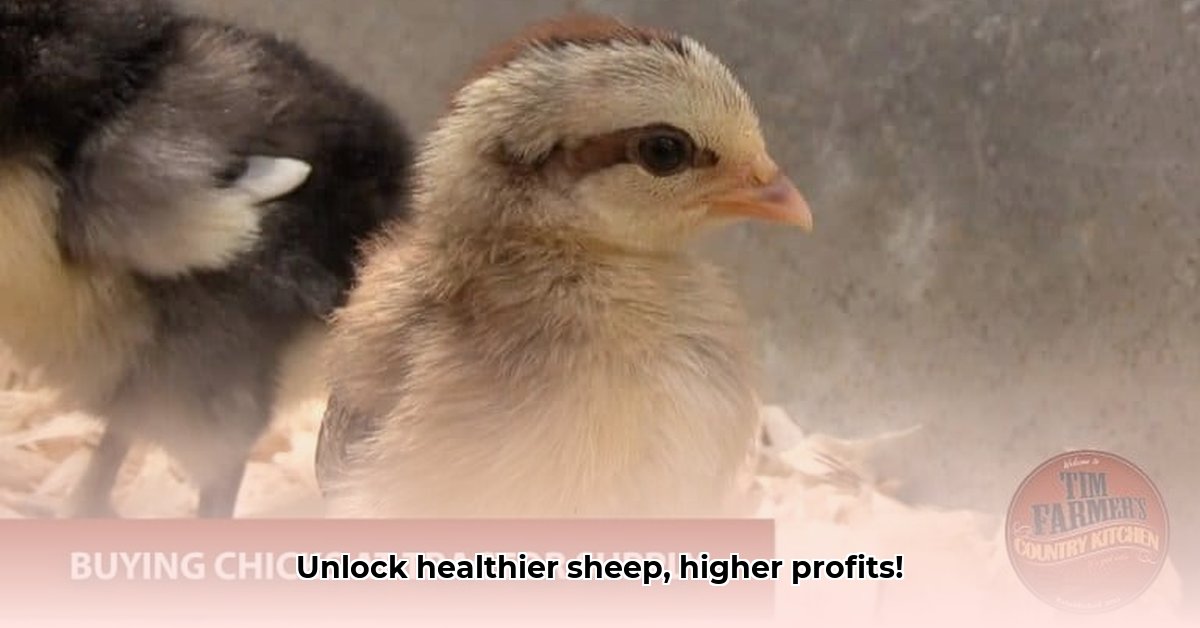
Raising healthy, productive sheep requires a deep understanding of their nutritional needs and a commitment to sustainable farming practices. This guide provides actionable steps to optimize your sheep's diet using Tractor Supply resources, minimizing environmental impact, and maximizing your farm's profitability. For bedding options, check out these pine shavings.
Understanding Your Sheep's Nutritional Needs: A Foundation for Success
Sheep nutritional needs vary dramatically depending on age, breed, and reproductive status. A young, rapidly growing lamb requires a high-energy, high-protein diet, unlike a mature ewe whose nutritional demands shift based on pregnancy or lactation. Ignoring these variations can lead to stunted growth, weaker lambs, and reduced overall flock health. Understanding these nuances is fundamental to effective sheep management.
Age-Specific Nutritional Requirements
Lambs (0-6 months): Require high-energy, high-protein diets to support rapid growth and development. Look for lamb starter feeds rich in protein and easily digestible energy sources.
Growing Sheep (6-12 months): Need a balanced diet to continue growth while building strong bones and a healthy immune system. Transition them gradually from lamb starter to a feed for growing sheep.
Mature Sheep (Over 12 months): Require a balanced diet to maintain their body condition, support wool production (for wool breeds), and ensure overall health.
Breeding Ewes: Have the highest nutritional demands, especially during pregnancy and lactation. They require increased energy and protein to support fetal development and milk production. Specialized feeds for breeding ewes are available from Tractor Supply.
Choosing the Right Sheep Feed at Tractor Supply: A Step-by-Step Guide
Selecting appropriate feed from Tractor Supply involves a strategic approach that integrates pasture assessment, flock evaluation, budget management, and expert consultation. This process ensures your flock receives optimal nutrition without unnecessary expense.
Assess Your Pasture: Conduct a soil test to identify nutrient deficiencies in your pasture. This crucial step informs your supplemental feeding strategy, ensuring you only supplement what's lacking. (A properly balanced pasture reduces reliance on expensive supplemental feeds).
Evaluate Your Flock: Consider the breed, age, and reproductive status of your sheep to determine their specific nutritional requirements. Different breeds have varying metabolic rates and nutrient needs.
Select Appropriate Feed: Based on your pasture assessment and flock evaluation, choose a feed that complements your pasture and meets your sheep's needs. Tractor Supply offers a wide variety of feeds formulated for different life stages and breeds.
Manage Your Budget: Compare feed options and prioritize cost-effectiveness. Strategic supplementation can often be more economical than relying solely on high-priced, complete feeds. For example, a high-quality pasture might only need a mineral supplement.
Mineral Supplementation: The Unsung Heroes of Sheep Nutrition
Minerals are essential for various bodily functions, including bone development, immune response, and wool production. Even with a rich pasture, mineral deficiencies can occur, impacting overall flock health. Tractor Supply offers various mineral supplements, including blocks and loose mixes, to address these deficiencies.
Mineral Blocks: Convenient and easy to manage, particularly suitable for smaller flocks.
Loose Mineral Mixes: Ideal for larger flocks, reducing competition and ensuring even mineral intake. Also facilitates better monitoring of consumption.
"Providing adequate mineral supplementation is crucial for maintaining optimal flock health and productivity," says Dr. Emily Carter, Veterinary Nutritionist at the University of Agricultural Sciences.
Pasture Management: Optimizing Forage Quality and Sustainability
Sustainable sheep farming prioritizes pasture health. Effective pasture management reduces reliance on purchased feed, minimizing environmental impact and improving farm economics.
Rotational Grazing: This technique involves rotating sheep amongst multiple paddocks, allowing each section to recover and regenerate, leading to higher quality forage and reduced overgrazing.
Forage Diversity: Planting a diverse mix of grasses and legumes increases nutrient availability, improves soil health, and enhances pasture resilience.
Weed and Parasite Control: Regular weed control and parasite prevention protect pasture quality and sheep health, reducing the need for additional veterinary interventions.
Monitoring Your Flock: Early Detection, Early Intervention
Regular observation of your sheep is crucial for early detection of nutritional deficiencies or health issues. Changes in behavior, appetite, or coat condition can indicate underlying problems. Early intervention is cost-effective and improves animal welfare.
Sustainable Sheep Farming: A Long-Term Investment
Sustainable practices enhance farm profitability while safeguarding the environment. They also improve animal welfare. This integrated approach fosters long-term success.
"Sustainable sheep farming is not just about environmental stewardship; it's a smart business decision," states John Miller, a seasoned sheep farmer and author of "The Sustainable Shepherd."
Comparing Sheep Feed Options from Tractor Supply (Example)
(Note: Prices and specific compositions may vary by location and market conditions.)
| Product Name | Key Features | Approximate Cost per Bag | Best Suited For |
|---|---|---|---|
| Lamb Starter | High protein, high energy for rapid growth | \$30 - \$40 | Young lambs |
| Mature Sheep Feed | Balanced nutrition for healthy adults | \$20 - \$30 | Adult ewes & rams |
| Breeding Ewe Supplement | Increased energy & protein for pregnancy/lactation | \$25 - \$35 | Pregnant & lactating ewes |
| Mineral Supplement Mix | Essential vitamins and minerals | \$15 - \$25 | All sheep |
Remember to consult with your veterinarian and local agricultural extension service for personalized recommendations tailored to your specific needs and region.